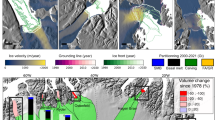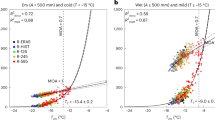Abstract
Climatic warming could cause increased melting from Antarctic ice shelves. Continued weakening of the ice shelves in this way would result in the ultimate collapse of most of the West Antarctic ice sheet. For complete removal of the ice shelves collapse of the ice sheet and a 5 m rise in world sea level could occur in <100 yr. More realistically, ice-shelf deterioration is likely to be a rather slow process, and even for a major and sustained warming trend ice-sheet collapse would take several hundred years, with most of the associated rise in sea level occurring during the final century. However, little is known about the glaciers that drain the northern part of the ice sheet. These glaciers have little or no protective fringe of ice shelf and, unless they flow over sufficiently high bedrock sills, they may show a more rapid response to increased temperatures.
This is a preview of subscription content, access via your institution
Access options
Subscribe to this journal
Receive 51 print issues and online access
$199.00 per year
only $3.90 per issue
Buy this article
- Purchase on Springer Link
- Instant access to full article PDF
Prices may be subject to local taxes which are calculated during checkout
Similar content being viewed by others
References
Mercer, J. H. Nature 271, 321–325 (1978).
Thomas, R. H. Nature 259, 180–183 (1976); Thomas, R. H. & Bentley, C. R. J. Glaciol. (in the press).
Rose, K. E. in Antarctic Geoscience (ed. Craddock, C.) (in the press).
Rose, K. E. J. Glaciol. (in the press).
Sanderson, T. J. O. J. Glaciol. (in the press).
Thomas, R. H. & Bentley, C. R. Quat. Res. 10, 150–170 (1978).
Bull, C. in Research in the Antarctic (ed. Quam, L.) 367–421 (American Association for the Advancement of Science, Washington, 1971).
Thomas, R. H. J. Glaciol. 12, 55–70 (1973).
Hughes, T. J. Rev. Geophys. Space Phys. 15, 1–46 (1977).
Thomas, R. H. Antarct. J. 11, 279–281 (1976).
Weertman, J. J. Glaciol. 3, 33–38 (1957); Kamb, B. Rev. Geophys. Space Phys. 8, 673–728 (1970).
Weertman, J. J. Glaciol. 3, 38–42 (1957).
Thomas, R. H. J. Glaciol. 12, 45–53 (1973).
Behrendt, J. C. Int. Ass. Sci. Hydrol. 86, 488–496 (1970).
Thomas, R. H. & Coslett, P. H. Nature 228, 47–49 (1970).
Robin, G., de, Q. J. Glaciol. (in the press).
Lamb, H. H. Climate Present, Past and Future, Vol. 2, 284 (Methuen, London, 1977).
Andrews, J. T., Mears, A., Miller, G. H. & Pheasant, D. R. Nature phys. Sci. 239, 147–149 (1972).
Author information
Authors and Affiliations
Rights and permissions
About this article
Cite this article
Thomas, R., Sanderson, T. & Rose, K. Effect of climatic warming on the West Antarctic ice sheet. Nature 277, 355–358 (1979). https://doi.org/10.1038/277355a0
Received:
Accepted:
Issue Date:
DOI: https://doi.org/10.1038/277355a0
This article is cited by
-
Interannual variations in meltwater input to the Southern Ocean from Antarctic ice shelves
Nature Geoscience (2020)
-
West Antarctic Ice Sheet retreat in the Amundsen Sea driven by decadal oceanic variability
Nature Geoscience (2018)
-
Research agendas in climate studies: the case of West Antarctic Ice Sheet research
Climatic Change (2014)
-
Stability of the West Antarctic ice sheet in a warming world
Nature Geoscience (2011)
-
Ongoing climate change following a complete cessation of carbon dioxide emissions
Nature Geoscience (2011)
Comments
By submitting a comment you agree to abide by our Terms and Community Guidelines. If you find something abusive or that does not comply with our terms or guidelines please flag it as inappropriate.



